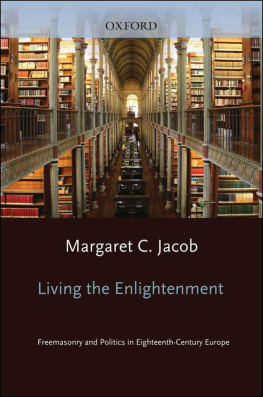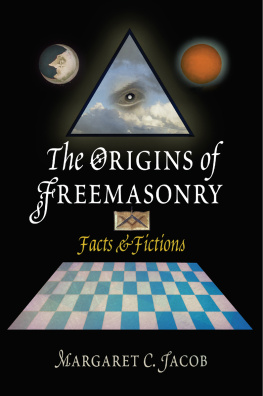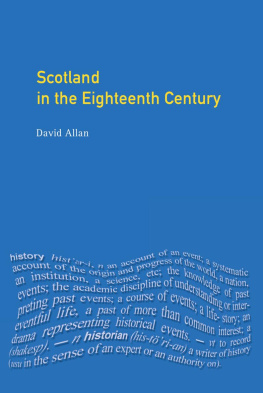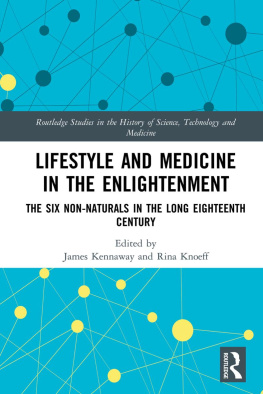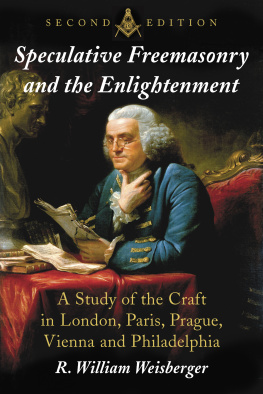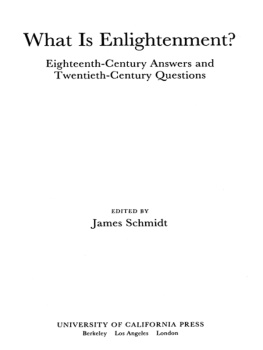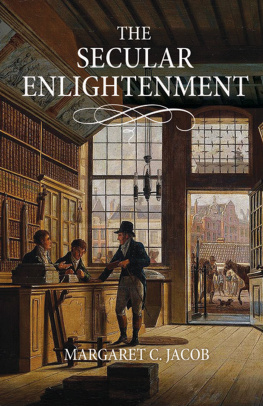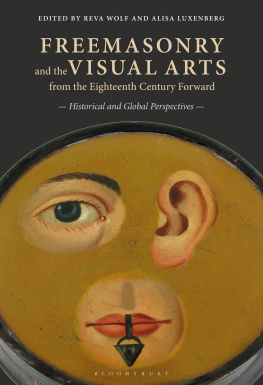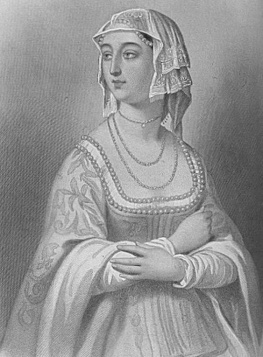Margaret C. Jacob - Living the Enlightenment: Freemasonry and Politics in Eighteenth-Century Europe
Here you can read online Margaret C. Jacob - Living the Enlightenment: Freemasonry and Politics in Eighteenth-Century Europe full text of the book (entire story) in english for free. Download pdf and epub, get meaning, cover and reviews about this ebook. year: 1991, publisher: Oxford University Press, USA, genre: Religion. Description of the work, (preface) as well as reviews are available. Best literature library LitArk.com created for fans of good reading and offers a wide selection of genres:
Romance novel
Science fiction
Adventure
Detective
Science
History
Home and family
Prose
Art
Politics
Computer
Non-fiction
Religion
Business
Children
Humor
Choose a favorite category and find really read worthwhile books. Enjoy immersion in the world of imagination, feel the emotions of the characters or learn something new for yourself, make an fascinating discovery.
- Book:Living the Enlightenment: Freemasonry and Politics in Eighteenth-Century Europe
- Author:
- Publisher:Oxford University Press, USA
- Genre:
- Year:1991
- Rating:3 / 5
- Favourites:Add to favourites
- Your mark:
- 60
- 1
- 2
- 3
- 4
- 5
Living the Enlightenment: Freemasonry and Politics in Eighteenth-Century Europe: summary, description and annotation
We offer to read an annotation, description, summary or preface (depends on what the author of the book "Living the Enlightenment: Freemasonry and Politics in Eighteenth-Century Europe" wrote himself). If you haven't found the necessary information about the book — write in the comments, we will try to find it.
Living the Enlightenment: Freemasonry and Politics in Eighteenth-Century Europe — read online for free the complete book (whole text) full work
Below is the text of the book, divided by pages. System saving the place of the last page read, allows you to conveniently read the book "Living the Enlightenment: Freemasonry and Politics in Eighteenth-Century Europe" online for free, without having to search again every time where you left off. Put a bookmark, and you can go to the page where you finished reading at any time.
Font size:
Interval:
Bookmark:
Living the Enlightenment
Freemasonry and Politics in Eighteenth-Century Europe
MARGARET C. JACOB

Oxford University Press
Oxford New York Toronto
Delhi Bombay Calcutta Madras Karachi
Petaling Jaya Singapore Hong Kong Tokyo
Nairobi Dar es Salaam Cape Town
Melbourne Auckland
and associated companies in
Berlin Ibadan
Copyright 1991 by Oxford University Press, Inc.
Published by Oxford University Press, Inc.,
198 Madison Avenue, New York, New York 10016-4314
Oxford is a registered trademark of Oxford University Press
All rights reserved. No part of this publication may be reproduced,
stored in a retrieval system, or transmitted, in any form or by any means,
electronic, mechanical, photocopying, recording, or otherwise,
without the prior permission of Oxford University Press.
Library of Congress Cataloging-in-Publication Data
Jacob, Margaret C., 1943
Living the enlightenment :
freemasonry and politics in eighteenth-century Europe/
Margaret C. Jacob.
p. cm. Includes index.
ISBN 978-0-19-506992-1 (Cloth)
ISBN 978-0-19-507051-4 (Paper)
1. FreemasonsEuropeHistory18th century.
2. FreemasonryPolitical aspectsEuropeHistory18th century.
3. EnlightenmentEurope. 4. EuropePolitics and government1648-1789.
I. Title. HS416.J33 1991 366. 1096609033dc20 91-8354
Photographic reproductions of books in its collection were kindly
supplied by the library of the Grand Lodge of The Netherlands and its
librarian, E. Kwaadgras. These appear in plates 19.
9 8
Printed in the United States of America
on acid-free paper
To Christopher Hill and Lynn Hunt
guides in matters revolutionary
The historian who works in many countries incurs more than the usual number of debts. Although mine mounted by the day through the late 1980s, first and foremost remained the Guggenheim Foundation and the New School for Social Research, both of which provided the financial support for a year of leave time. Also at the New School my assistant, Ursula Levelt, provided superb linguistic skills, patience, and care.
Because I am writing here about a private society that is still very much alive, particularly in Continental Europe, I have been unusually dependent upon private archives and archivists. By far my greatest debt is to the members of La Bien Aime, the lodge in Amsterdam with its extraordinary set of records. None of the chapters that depend on those archives would have been possible without the gracious assistance of Hilco Rodermond, who photocopied the entire eighteenth-century archive for me; and J. Kistemaker, who provided conversation and wisdom. Not least, I have been helped by the earlier historical studies of the Dutch historian Willem Kat. Of course the history of European freemasonry in the eighteenth century could barely be written without the splendid library of the Grand Lodge of the Netherlands and its librarian emeritus, B. C. van Uchelen. Readers wishing to consult that collection, which is strong in French and German freemasonry, as well as Dutch, should know that at this time (1990) efforts are being made to relocate it at the Royal Library in The Hague. Wherever it is housed, scholars can only be assisted by its enormous and rich collection and the willingness of the Grand Lodge to help and encourage them. In Belgium, L. Verlee provided gracious assistance in locating private archives, which, due to local circumstances, are not automatically available to the general public.
At the Bibliothque Nationale in Paris the librarian of the masonic collection, Florence de Lussy, gave assistance far above the call of duty. At the Central Library, Dundee, Scotland, I was assisted with bibliographical material, and I also want to thank Iain Fleet, archivist, Archive and Record Centre, City Chambers, Dundee. Permission to use the primary source material at Dundee came from B. N. Bowman, clerk to the Three United Trades, Dundee; they hold the copyright on GD/GRW/M 1/1, Sederunt book 17361807; GD/GRW/M 2/1 Boxmasters account book 17061760; and GD/GRW/M 3/1 Register of entries of masters and journeymen 16591779. The Lockit Book, still in use, is in the possession of the clerk.
Some publishers and libraries need to be thanked for permission to reprint or to cite manuscript material. E. J. Brill Inc. allowed me to reprint portions of , which first appeared in an essay in Women and the Enlightenment, a collection published by Haworth, Binghamton, New York, in 1976 for The Institute for Research in History. Dr. Williamss Library, London, and its librarian, John Creasey, gave permission to quote from one letter in the Kenrick-Wodrow correspondence. The archivist at the municipal library in Namur, Ren Leboutte, also made every effort to assist.
Various American and European scholars shared their knowledge of archives or read portions of the text: Herbert Rowen, Ferenc Feher, Hugo de Schampheleire, Els Witte, N. Luitse, Gordon DesBrisay, and not least, Wijnand Mijnhardt, with whom I have had many important conversations. Martin Weiner read a portion of and said very helpful things. Larry Stewart located an important masonic manuscript at the Royal Society of London. J. Appleby read, queried, and inspired. The editors at Oxford University Press have been prompt and efficient. None of these generous and helpful people are responsible for any of the errors that may still exist.
Janja Lalich proved to be a supremely competent editor for the opening chapters. Carroll Joynes, Don Scott, and the members of the Pro-Seminar on Knowledge, Culture and Power at the New School were good and kind critics. Janet M. Burke has been willing to share her important work on women freemasons.
The books dedication speaks from my own history, intellectual and personal.
B.A. | the manuscripts of the Amsterdam lodge, La Bien Aime, to be found at the library in the Grand Lodge of the Netherlands, 22 Fluwelenburgwal, The Hague |
B.L. | British Library, London |
B.N. | Bibliothque Nationale, Paris |
B.N.U. | Bibliothque Nationale et Universitaire, Strasbourg |
FM | Freemasonry collection, Bibliothque Nationale, Paris |
G.L. | the library in the Grand Lodge of the Netherlands, The Hague |
Kloss MSS | always refers to the collection of that title in the library of the Grand Lodge of the Netherlands, The Hague |
In general I have neither modernized the foreign languages nor sought to provide French accent marks not supplied by the original eighteenth-century authors. The original language is given in footnotes for the specialist reader; translations are intended to give the sense of the text with specialists expected to consult the original for the full text. It should be remembered that many Dutch writers of French were using a second language and, as a result, their French can be somewhat eccentric. Many scribes recorded masonic minutes, but not for twentieth-century readers. Every effort has been made to keep this authors errors of transcription to a minimum.
Living the Enlightenment
In the 1740s the Parisian police arrested, searched, and systematically interrogated freemasons. We know about these events because the reports of what was said made their way into the records housed in the Bastille.
Next pageFont size:
Interval:
Bookmark:
Similar books «Living the Enlightenment: Freemasonry and Politics in Eighteenth-Century Europe»
Look at similar books to Living the Enlightenment: Freemasonry and Politics in Eighteenth-Century Europe. We have selected literature similar in name and meaning in the hope of providing readers with more options to find new, interesting, not yet read works.
Discussion, reviews of the book Living the Enlightenment: Freemasonry and Politics in Eighteenth-Century Europe and just readers' own opinions. Leave your comments, write what you think about the work, its meaning or the main characters. Specify what exactly you liked and what you didn't like, and why you think so.

